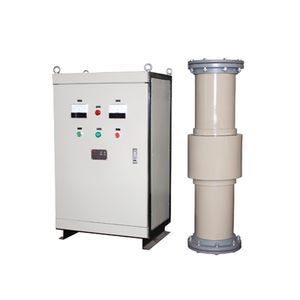
- Packing - Handling - Logistics
- Conveying
- Gantry metal detector
- LONGi Magnet Co., Ltd
- Company
- Products
- Catalogs
- News & Trends
- Exhibitions
Gantry metal detector for bulk materialsmagneticfor the chemical industry
Add to favorites
Compare this product
Characteristics
- Type
- gantry
- Applications
- for bulk materials
- Other characteristics
- magnetic
- Domain
- for the chemical industry, for the mining industry
Description
The new generation of LJT-B metal detectors are suitable for the fields such as mine, metallurgy, cement, power station, coal, wood, chemical industry, coke, and ferrous and non-ferrous mine with wicked working conditions. LJT-B metal detectors can detect some metal contamination mixed in materials of iron ore, coal, wood, copper ore, aluminum ore and other ores to protect the belt and equipment in following up procedure. Magnetic separator can just remove ferrous metal, but not non-ferrous metal like manganese steel. While LJT-B metal detector can detect metal contamination in the common materials as well as iron ore with grade no higher than 60%, even nonferrous metal like manganese steel. Metal detectors are playing very important roles in protecting crushing equipment, ensuring safe running of the conveyor belt, improving working efficiency, reducing labor intensity and raising automation level.
When metal passes the sensor, it forms inductance variation and eddy current, which forms electric impulse signal. Through processing of circuits, the signal is outputted as passive endpoint of the relay with one open and closed respectively.
LONGi’s in house laboratory is well known for providing professional and accurate sample testing for a wide variety of clients in both the mineral and recycling industries. Based on the lab test results and often a necessary site survey our experienced engineers are proud to be able to offer the best solution available every time we can. Not only do we look for the solution to best process the end users material, but, we are mindful to provide the best value and performance in the most economical way.
Catalogs
No catalogs are available for this product.
See all of LONGi Magnet Co., Ltd‘s catalogsOther LONGi Magnet Co., Ltd products
Magnetic Separation Ancillary Equipment
Related Searches
- LONGI solids separator
- Centrifugal classifier
- Liquids separator
- LONGI magnetic separator
- LONGI process separator
- Gravity classifier
- LONGI separator for the recycling industry
- LONGI particle separator
- LONGI metal separator
- Oil separator
- Automatic separator
- Separator for the chemical industry
- Water separator
- Compact classifier
- Stainless steel separator
- High-efficiency classifier
- Vertical classifier
- Dry classifier
- Bulk material separator
- Magnetic drum separator
*Prices are pre-tax. They exclude delivery charges and customs duties and do not include additional charges for installation or activation options. Prices are indicative only and may vary by country, with changes to the cost of raw materials and exchange rates.


